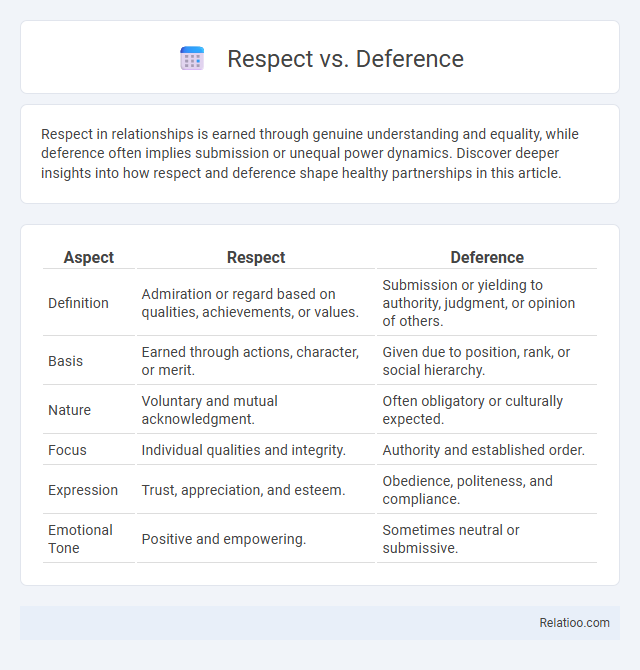Respect in relationships is earned through genuine understanding and equality, while deference often implies submission or unequal power dynamics. Discover deeper insights into how respect and deference shape healthy partnerships in this article.
Table of Comparison
| Aspect | Respect | Deference |
|---|---|---|
| Definition | Admiration or regard based on qualities, achievements, or values. | Submission or yielding to authority, judgment, or opinion of others. |
| Basis | Earned through actions, character, or merit. | Given due to position, rank, or social hierarchy. |
| Nature | Voluntary and mutual acknowledgment. | Often obligatory or culturally expected. |
| Focus | Individual qualities and integrity. | Authority and established order. |
| Expression | Trust, appreciation, and esteem. | Obedience, politeness, and compliance. |
| Emotional Tone | Positive and empowering. | Sometimes neutral or submissive. |
Understanding Respect and Deference: Key Definitions
Respect involves recognizing and valuing another person's qualities, rights, or achievements, establishing a foundation of mutual esteem. Deference emphasizes yielding to someone's judgment or authority based on their position, expertise, or experience, reflecting acknowledgment of hierarchical or social structures. Understanding these distinctions clarifies how respect fosters genuine regard, while deference often involves outward acknowledgment or submission within interpersonal or organizational dynamics.
Historical Perspectives on Respect and Deference
Historical perspectives reveal that respect often stemmed from recognition of an individual's inherent worth, while deference was culturally rooted in hierarchical social structures requiring submission to authority figures. Ancient societies, such as feudal Japan and medieval Europe, institutionalized deference through rigid class systems, contrasting with Enlightenment ideals that promoted respect based on equality and human rights. Understanding how your approach incorporates these evolving principles can enhance interpersonal and diplomatic relations by balancing honor and strategic courtesy.
The Psychology Behind Respect and Deference
Respect arises from recognizing another's inherent worth and competence, fostering genuine admiration that influences social interactions and self-esteem. Deference reflects a psychological mechanism rooted in social hierarchies and power dynamics, where individuals yield to authority or status to maintain group cohesion and reduce conflict. Understanding these distinctions reveals how diplomacy strategically balances respect and deference to navigate interpersonal relationships and achieve mutually beneficial outcomes.
Cultural Variations in Respect and Deference
Cultural variations in respect and deference reveal significant differences in social hierarchies and interpersonal communication across societies. In collectivist cultures such as Japan and South Korea, deference is often shown through formal language, honorifics, and ritualized gestures that emphasize hierarchy and group harmony. Western cultures may prioritize respect through individual recognition and equality, reflecting cultural values that emphasize autonomy and direct communication styles.
Social Hierarchies: When Deference is Expected
Deference is often expected in social hierarchies where power dynamics dictate behavior, signaling submission or acknowledgment of authority, while respect reflects genuine admiration without necessarily implying hierarchy. Diplomacy involves tactful communication to navigate social nuances and maintain harmony among differing ranks or opinions. You can effectively manage interactions by understanding when to show deference to uphold social order and when to use diplomacy to foster cooperation.
Respect in Personal Relationships vs. Deference in Authority Structures
Respect in personal relationships involves mutual recognition of individual worth and empathy, fostering trust and emotional connection. Deference in authority structures requires acknowledging hierarchical roles and submitting to decisions or rules for social order and organizational efficiency. Balancing respect and deference ensures healthy interpersonal dynamics and functional governance within both private and institutional contexts.
Workplace Dynamics: Balancing Respect and Deference
Balancing respect and deference in workplace dynamics involves recognizing your colleagues' expertise while maintaining your own voice and confidence. Respect fosters mutual understanding and collaboration, whereas deference emphasizes acknowledging hierarchy and experience without compromising your contributions. Effective diplomacy navigates these interactions, ensuring professional relationships thrive through tactful communication and emotional intelligence.
Common Misconceptions about Respect and Deference
Respect often gets mistaken for deference, yet respect involves genuine appreciation of someone's qualities, while deference implies yielding authority or judgment to another's position. Common misconceptions confuse respect with automatic submission, overlooking that true respect can coexist with critical thinking and self-assertion. Deference is frequently perceived as weakness, but it strategically maintains social harmony through acknowledging hierarchical roles without compromising personal integrity.
Cultivating Respect Without Encouraging Blind Deference
Cultivating respect involves recognizing individuals' intrinsic value and contributions, fostering mutual understanding without demanding unquestioning obedience. Unlike deference, which implies yielding to authority or expertise often without critical evaluation, respect encourages independent thought and open dialogue. Diplomacy serves as the skillful balance in communication, promoting respect through tact and consideration while avoiding the pitfalls of blind deference that can stifle authentic interaction and growth.
Practical Scenarios: Choosing Respect or Deference
In practical scenarios, choosing respect over deference often empowers your voice and fosters genuine relationships by valuing mutual understanding rather than hierarchy. Deference may be appropriate in formal settings or when expertise is acknowledged, but respect ensures dignity and equality in everyday interactions. Your ability to discern when to show respect versus deference can significantly impact leadership effectiveness and conflict resolution.

Infographic: Respect vs Deference
 relatioo.com
relatioo.com